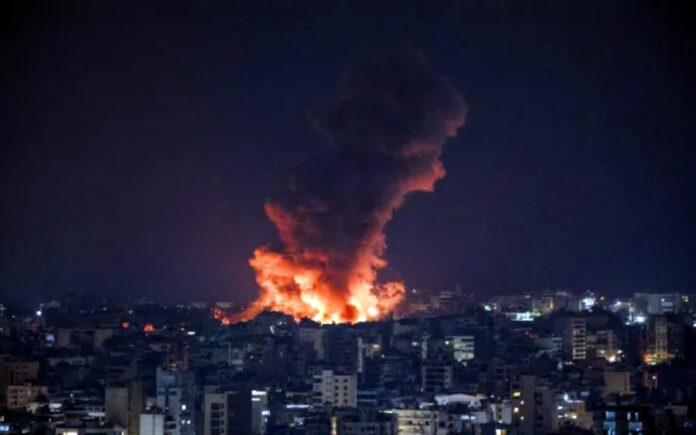Beirut: Massive, consecutive strikes rocked Beirut’s southern suburbs from late Saturday into Sunday, creating a series of booms heard across the city and illuminating the sky with flashes of red and white for nearly 30 minutes, as reported by Reuters eyewitnesses. These attacks follow days of Israeli bombardment targeting neighborhoods viewed as strongholds for the Iran-backed armed group Hezbollah, leading to the reported death of its leader, Sayyed Hassan Nasrallah, and possibly his successor.
A Lebanese security source revealed on Saturday that Hashem Safieddine, the potential successor to Nasrallah, had been out of contact since Friday following an Israeli airstrike near the city’s international airport, which was believed to have targeted him. The Israeli military confirmed that it eliminated Nasrallah in a strike on Hezbollah’s central command headquarters in Beirut on September 27, a claim that Hezbollah has since acknowledged.
Hezbollah Under Fire
The latest Israeli strikes in the Dahiyeh residential area, known as a Hezbollah stronghold south of central Beirut, have impeded rescue operations following an earlier attack on Thursday night.
Hezbollah has not yet commented on the status of Safieddine. His death would further weaken the group and its Iranian backers, especially as Israeli operations across the region have intensified in recent weeks, leading to significant losses in Hezbollah’s leadership.
Israel is broadening its military actions in Lebanon. On Saturday, it conducted its first strike in the northern city of Tripoli, and Israeli troops initiated raids in the south. Reports indicate at least eight strikes rattled Beirut’s southern suburbs late Saturday, including areas close to the airport, after the Israeli military advised residents to evacuate. Previously, exchanges of fire between Israel and Hezbollah had been primarily confined to the Israel-Lebanon border, coinciding with Israel’s ongoing conflict with Hamas in Gaza.
Israeli military spokesperson Rear Admiral Daniel Hagari stated that Israel has killed 440 Hezbollah fighters in its ground operations in southern Lebanon and has targeted approximately 2,000 Hezbollah sites. Hezbollah has not disclosed its casualty figures.
According to Israeli officials, the intensified assault on Hezbollah aims to facilitate the safe return of tens of thousands of citizens to northern Israel, who have faced bombardments from the group since October 8.
Also Read | China and North Korea Celebrate 75 Years of Diplomatic Relations with Renewed Commitment to Cooperation
Civilian Casualties and Displacement
The Israeli offensive has resulted in hundreds of Lebanese civilian deaths, according to Lebanese officials, and has displaced around 1.2 million people—nearly a quarter of Lebanon’s population.
A Lebanese security official reported that Saturday’s strike on a Palestinian refugee camp in Tripoli resulted in the deaths of a Hamas member, his wife, and two children. Media outlets linked to Hamas stated that the attack killed a leader of its armed wing, identified as Saeed Atallah.
While Israel confirmed the killing of two Hamas members operating in Lebanon, it did not specify if they were involved in the Tripoli strike, a Sunni-majority port city also affected during the 2006 conflict with Hezbollah.
In northern Israel, air raid sirens prompted residents to seek shelter amid rocket fire from Lebanon. Hezbollah claimed responsibility for firing missiles at what it termed the “ATA company for military industries near the Sakhnin base,” close to Haifa, though the specifics of the target remain unclear. The Israeli army reported that two projectiles were launched from Lebanon; one was intercepted, and the other landed without causing damage.
Also Read | Russian Fighter Jet Shot Down by Ukraine, Moscow Claims Advances
Marking the Anniversary of October 7
As the anniversary of Hamas’ October 7 attack on southern Israel approaches, the violence has escalated significantly. This attack resulted in the deaths of 1,200 individuals and around 250 hostages, according to Israeli figures. Israel’s subsequent military response in Gaza has led to nearly 42,000 Palestinian deaths, as reported by Gaza’s health ministry, with almost the entire population of 2.3 million displaced. The humanitarian crisis has incited widespread international protests, with thousands demonstrating in major cities globally.
Iran, a key supporter of both Hezbollah and Hamas, has also faced losses of prominent commanders within its Revolutionary Guards Corps due to Israeli airstrikes this year. Recently, Iran launched ballistic missiles at Israel, which resulted in minimal damage. Israel is currently deliberating its response to this escalation.
Oil prices have risen amid concerns over a potential Israeli attack on Iranian oil facilities. U.S. President Joe Biden urged Israel on Friday to consider alternatives to targeting Iranian oil infrastructure.
In a related development, Army General Michael “Eric” Kurilla, the top U.S. general for the region, is visiting the Middle East, although specific details regarding his locations remain undisclosed.



